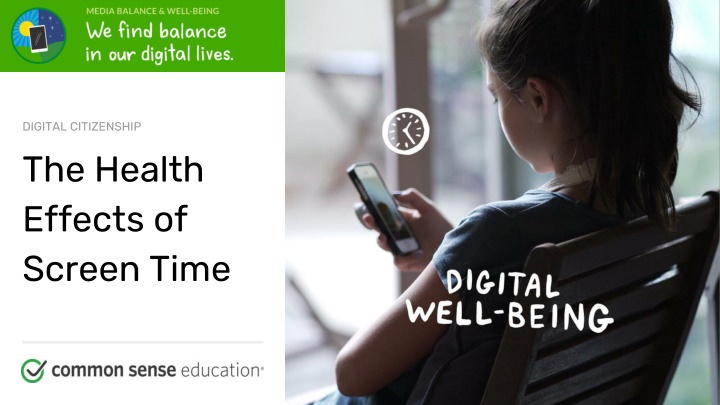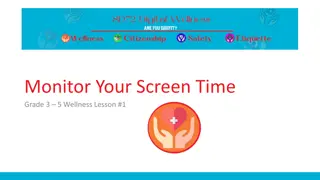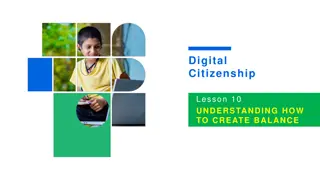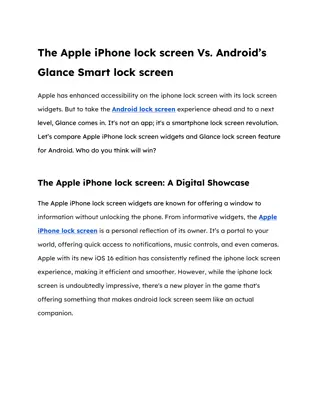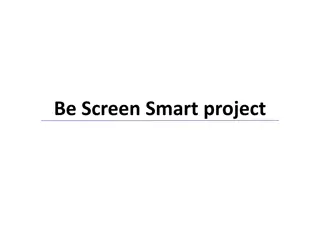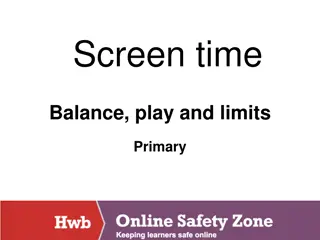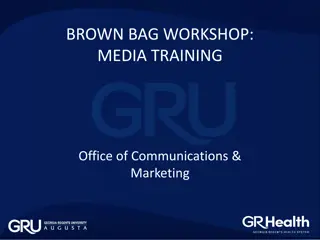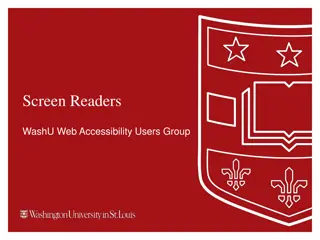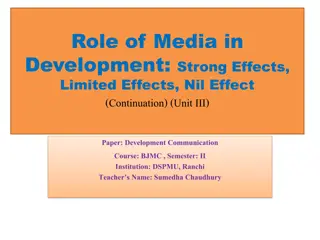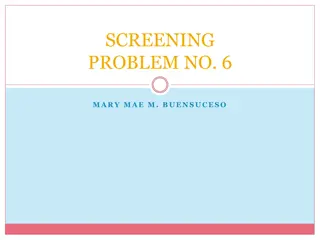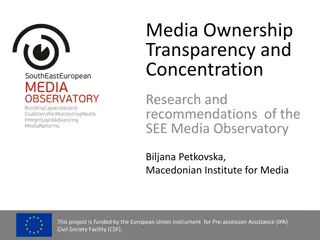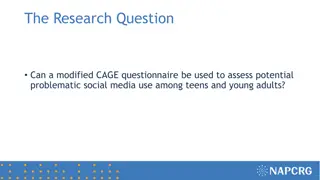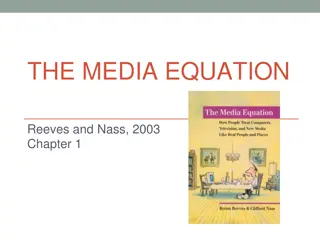The Health Effects of Screen Time: Understanding Media Balance
The impact of screen time on our health and well-being, this resource delves into the importance of achieving media balance in today's digital age. From discussing key vocabulary to analyzing negative effects, it prompts reflection and critical thinking on screen usage.
Download Presentation

Please find below an Image/Link to download the presentation.
The content on the website is provided AS IS for your information and personal use only. It may not be sold, licensed, or shared on other websites without obtaining consent from the author.If you encounter any issues during the download, it is possible that the publisher has removed the file from their server.
You are allowed to download the files provided on this website for personal or commercial use, subject to the condition that they are used lawfully. All files are the property of their respective owners.
The content on the website is provided AS IS for your information and personal use only. It may not be sold, licensed, or shared on other websites without obtaining consent from the author.
E N D
Presentation Transcript
DIGITAL CITIZENSHIP The Health Effects of Screen Time commonsense.org/education Shareable with attribution for noncommercial use. Remixing is permitted.
Essential Question Can screen time be bad for us? Can screen time be bad for us? commonsense.org/education Shareable with attribution for noncommercial use. Remixing is permitted.
KEY VOCABULARY Media balance Using media in a way that feels healthy and in balance with other life activities (family, friends, school, hobbies, etc.) commonsense.org/education Shareable with attribution for noncommercial use. Remixing is permitted.
ACTIVITY: HOW MUCH IS TOO MUCH? Discuss: How many hours a day of screen time do you think is unhealthy? How much is too much? Explain why you think this amount is too much. What are the negative effects of too much screen time? commonsense.org/education Shareable with attribution for noncommercial use. Remixing is permitted.
WATCH + DISCUSS Screen Time: How Much Is Too Much? Co-produced with Common Sense Education @CommonSenseEd Even by conservative estimates, the average American spends over 6 hours per day staring at a screen. That s a lot of time. What does the scientific research say about it? Is it good or bad for us? TEACHERS: Get your students in the discussion on KQED Learn, a safe place for middle and high school students to investigate controversial topics and share their voices. Link TK ABOVE THE NOISE is a show that cuts through the hype and investigates the research behind controversial and trending topics in the news. Hosted by Myles Bess. *NEW VIDEOS EVERY OTHER WEDNESDAY* SUBSCRIBE by clicking the RED BUTTON above. Follow us on Instagram @kqedabovethenoise ** What do we mean by the term screen time , exactly? Screen time as a term isn t that useful, because it doesn t really tell you what you re doing on screen. It s kind of like if someone asks you what you had for lunch, and you say food -- that doesn t provide any real info. And not all screen time is created equal. Context matters. Spending 4 hours creating a video for YouTube is WAY different than spending 4 hours watching cat videos. How you feel about and how you process each of those situations won t be the same, so lumping them all under screen time doesn t make much sense. ** So is screen time good or bad for us? Our digital lives can take a physical toll on us -- multiple studies have shown that excess screen time can lead to bad sleep. And some researchers even use the term addiction when talking about how we interact with our devices, although there s a lot of debate on whether or not screen time can be a bona fide addiction like gambling. And there is some research that found that the more time people spent in front of screens, the more it affected their well-being -- their chances of developing depression and suicidal thoughts went up. On the flip side, screens allow us to stay connected with people. Sure, some people have to deal with feeling overwhelmed because of drama or feeling pressure to only post a highlight reel of themselves to make them look good to others. But, in many studies, a majority of teens say that social media mainly helps the relationships they already have with their friends. And when you look at stuff like multiplayer video games, Twitch streams, or Reddit, wandering around online allows you to find your tribe . If you don t quite fit in where you live, or you live in a small or isolated community, QUALITY screen time might be essential to keeping you sane. SOURCES: Media Use By Tweens and Teens (Common Sense) https://www.commonsensemedia.org/sites/default/files/uploads/research/census_researchreport.pdf Searching for digital technology s effects on well-being (Nature) https://www.nature.com/articles/d41586-018-07503-w Teens, Social Media Technology 2018 (Pew Research Center) https://www.pewinternet.org/2018/05/31/teens-social-media-technology-2018/ Increases in Depressive Symptoms, Suicide-Related Outcomes, and Suicide Rates Among U.S. Adolescents After 2010 and Links to Increased New Media Screen Time (Clinical Psychological Science) https://static1.squarespace.com/static/5a21a88bcd39c3ec782756ed/t/5af5e61c758d46b9d4e9db7a/1526064668631/suicidio2167702617723376.pdf The Kids (Who Use Tech) Seem to Be All Right (Scientific American) https://www.scientificamerican.com/article/the-kids-who-use-tech-seem-to-be-all-right/ The association between adolescent well-being and digital technology use (Nature Human Behaviour) https://www.gwern.net/docs/psychology/2019-orben.pdf Passive Facebook Usage Undermines Affective Well-Being (Journal of Experimental Psychology) https://ppw.kuleuven.be/okp/_pdf/Verduyn2015PFUUA.pdf Facebook Use Predicts Declines in Subjective Well-Being in Young Adults (PLoS One) https://journals.plos.org/plosone/article/file?id=10.1371/journal.pone.0069841type=printable Digital Life and Youth Wellbeing, Social Connectedness, Empathy, and Narcissism (Pediatrics) https://pediatrics.aappublications.org/content/pediatrics/140/Supplement_2/S71.full.pdf FOR EDUCATORS KQED Learn https://learn.kqed.org KQED Teach https://teach.kqed.org KQED Education https://ww2.kqed.org/education https://www.facebook.com/KQEDEducation https://twitter.com/KQEDedspace https://www.instagram.com/kqededucation About KQED KQED, an NPR and PBS affiliate in San Francisco, CA, serves Northern California and beyond with a public-supported alternative to commercial TV, Radio, and web media. Funding for Above the Noise is provided in part by the Corporation for Public Broadcasting, Silver Giving Foundation, Stuart Foundation, and William and Flora Hewlett Foundation. To watch this video on KQED Learn and to continue the discussion, click here. commonsense.org/education Shareable with attribution for noncommercial use. Remixing is permitted.
KEY VOCABULARY The term screen time is too general. Look at how long/often you use your screen AND what you are using it for Active use Contributing online via posts, comments, or other forms of communication and expression Passive use Scrolling through online content without reacting to the content commonsense.org/education Shareable with attribution for noncommercial use. Remixing is permitted.
Digital Media Habits Personal Reflection Personal Reflection Think of two digital habits in your life that are active and two that are passive. For each one, draw an emoji or write one word to describe how it makes you feel. Active Digital Habits Passive Digital Habits 1. 1. 2. 2. A picture containing text Description automatically generated commonsense.org/education Shareable with attribution for noncommercial use. Remixing is permitted.
Digital Media Habits Making a change for the better Making a change for the better Choose one digital habit you want to change or try to do differently. What is the habit, and why is it important to you to change it? Make a plan for how you would like to change your habit. Consider when you will do something different and what you can do instead. commonsense.org/education Shareable with attribution for noncommercial use. Remixing is permitted.
commonsense.org/education Shareable with attribution for noncommercial use. Remixing is permitted.
